#bl linguistics
Text

ถ้ามีรุ้งด้วยก็คงจะดี /thaa mee rung duuay gaaw khohng ja dee/
รุ้ง /rung/ is a rainbow, the entire spectrum of light, all of the colors.
Rung is the name of Mork's sister. So what he says here, could also be read as:
"If Rung was here too, that would be nice."
You know how rainbows are formed? Light refracts in airborne water droplets. And you know what is made of such water droplets and can thus create a rainbow? หมอก /maawk/ - mist, fog, Mork.

It's not just Day who realized that he can still experience the world in all its beauty. I think Mork also realized that what matters is in your heart. Because he'll always carry Rung with him, wherever he goes.
Rung is all around them.

My usual disclaimer applies: not a native Thai speaker, still learning 🙏
#last twilight#last twilight meta#thai bl#local woman harps on about linguistics#i'm in my feels y'all#the amount of tears i shed ;;#i have a bunch of language notes but i'm too emotional to work on that today#local woman harps on about last twilight
740 notes
·
View notes
Text
Love for Love's Sake | Things You Didn't Notice #4 | Fight with Homophobes
Honestly, I wanted to dissect these scenes right away but then we got the rest of the show uploaded and the emotions overshadowed me. But now we're diving into informal Korean speech, swearing and slurs! It's going to be a fun post, let's go :D
Disclaimer: I'll be writing down both English and Korean slurs strictly in educational manner, obviously.
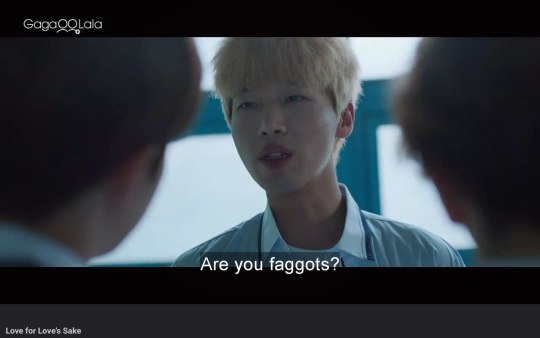
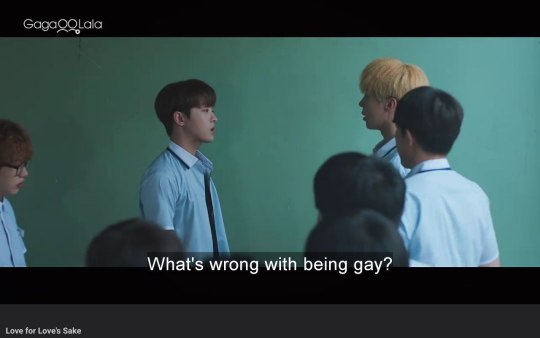
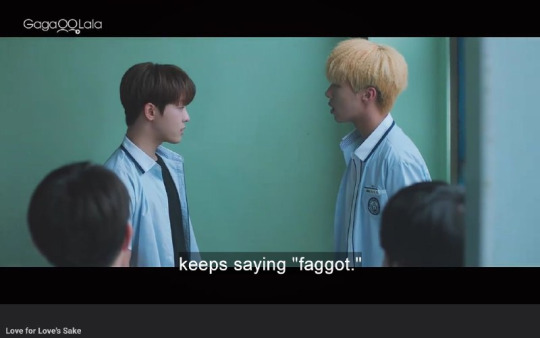

"Fuck. You two are always so fucking close together. (to Myungha) Are you also a faggot (homosekki)? Wow, Kyunghyun's skills are so good."
"Why are you so vulgar? What's wrong with being homo?"
"You're really crazy. Are you criticizing me?"
... (Myungha kisses Tak Junho)
" Ah fu— You damn faggot!"
"We both kissed. I'm not the only one who's homo. You're homo too~"
"You did it yourself, you faggot!"
"Ah, our Junho keeps saying 'homo'. Tss, slurs are forbidden."
"Shut up, you faggot."
"If you call me homo one more time, I can steal your lips for real. (Junho is silent) Ha, afraid you'll be robbed?"
Honestly, I like the translation in subs this time, I just wanted to give you a more technical version (and to show you the difference, because in Gaga subs the f slur is also used by Myungha but it's not exactly that)
So, as far as I noticed, the slur in Korean is a derivative from the term "homosexual" - thanks to the similar sounding, it became "homosekki" (from sekki - asshole, bastard, bitch etc). This is the word Junho keeps using in almost every sentence. And the socially accepted common term is now "gay" (at least, the cast and couple from Korean reality dating show "His Man 2" refers to themselves as 'gay' and not 'homo').
Myungha uses the original term, just "homo", which also gained a negative connotation but doesn't include a 'sekki' swearword. So he keeps saying "homo" to talk back in the language Junho used, only less derogatory. We'll see later but it's amazing, because both Myungha and Sangwon confidently used this word about themselves (Sangwon even went further and proudly reclaimed the slur itself).
Still, Myungha did threaten gangster Junho not to even call him "homo" or any similar terms. And here's the moment which made me laugh: in the next scene with Sangwon, Junho was angry ranting about Myungha, but he caught himself using the slur "homosekki" and quickly changed to the modern and neutral term "gay". LOL
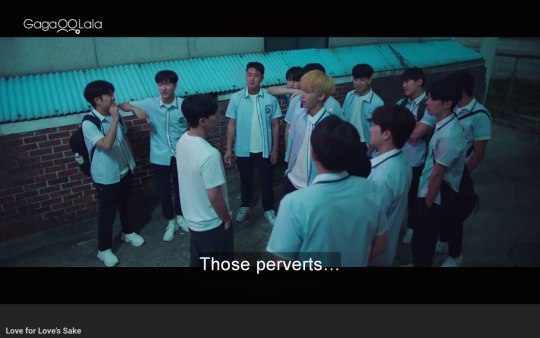
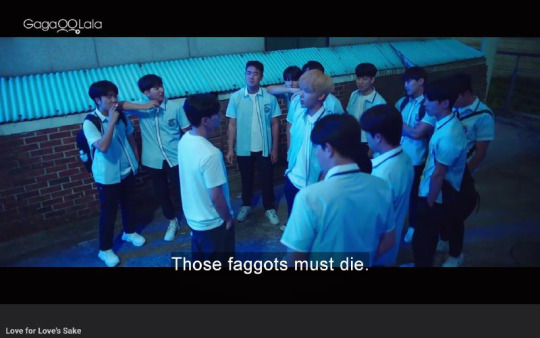
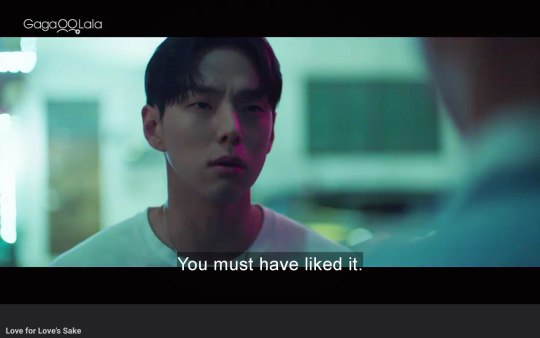
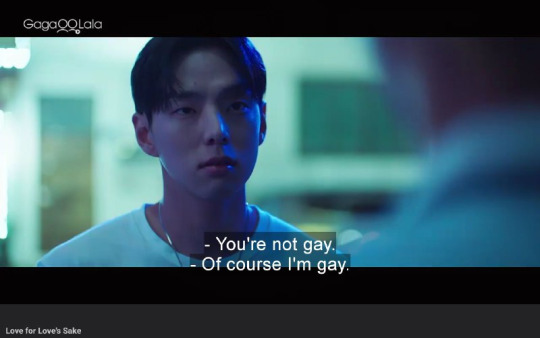
Which is what Gaga subs failed to show it to us. Again, let's see more technical translation:
"I'll go after Tae Myungha and Ahn Kyunghoon soon, just so you know. Those fa– Those gay bastards must die. That fucker Tae Myungha kissed me in the lips, shit. Isn't it fucked up? It was disgusting."
(Sangwon, pouting) "Wow, really? It must've been nice."
"Jeez, you asshole. You're not a victim so you dare talking shit."
"I'm being serious, though?"
(Junho, appalled) "What the hell are you talking about? You're not a faggot."
"I am a faggot, though?"
One, why is it so funny that the first reaction Sangwon had, hearing about Myungha kissing someone in a fight, was: awww :( i wish it was me :((( you so lucky :((
Second, it's hilarious how the gangster ends up the ONLY person who ever uses nice and modern term "gay" once in this show because our protagonists both hit him back with the derogatory terms (Sangwon even attached the slur to himself, when he only liked girls before falling in love with Myungha at first sight, what a legend).
Let's wrap it up with slurs and check out another small detail: informal speech in Korean.
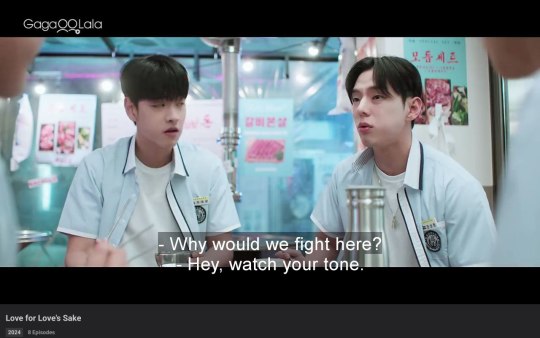
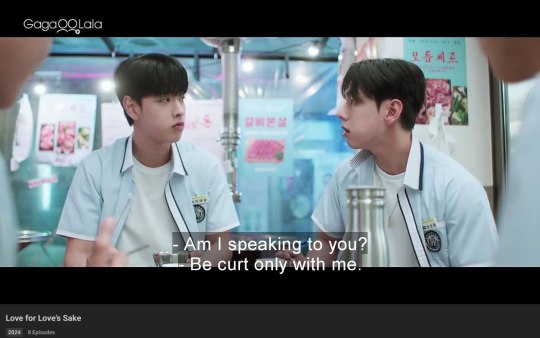
(Sangwon to Myungha)"Why would we fight here?"
(Yeowoon to Sangwon)"Hey, watch your tone (don't use informal speech)"
"Was I talking like that with you?"
"Talk curt (informally) only with me."
"I'm already being curt (talking informally) with you."
This one is definitely a cultural thing that always gets lost in translation (but "being curt" is a nice way of putting it). There are two general styles of speech in Korean: Formal (존댓말, jondemal) and Informal (반말, banmal). Of course, it's a lot more complicated in the language, but I'll paint briefly the differences that are pointed out in the scene.
I talked in previous posts about properly addressing your senior in korean (usually by title/position). To convey respect to your senior, you also use 요 (yo) at the end of the sentences – and both Sangwon and Yeowoon talk politely to Myungha. UNTIL Sangwon uses the rude version of a question, without polite ending ("Why would we fight here?"), to which Yeowoon protests and tells Sangwon that it's banmal, informal speech, and he should only use it with him.
Because with your friends, same age people (Yeowoon and Sangwon in this case) or people younger than you, it's normal to use their names with different intonations (Think Myungha's "Yeowoon-ah, Yeowoon-ie") and talk informally.
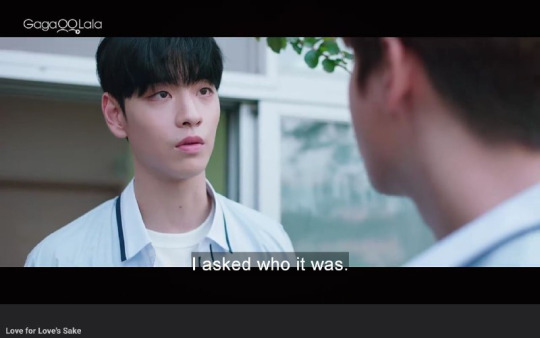
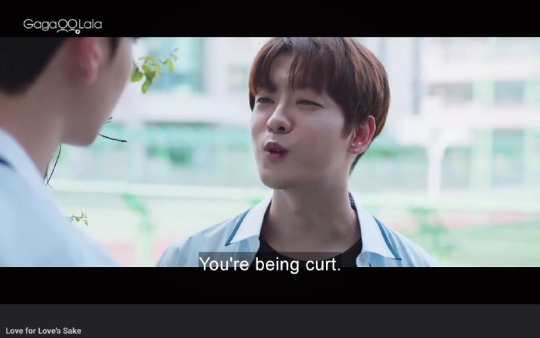
(Yeowoon to Myungha) "I asked who it was."
"You're being curt (that's an informal speech)".
Fast forward – Yeowoon loses patience and demands Myungha "I asked who it was", question without polite ending as well. To which Myungha cheekily says "that was an informal speech", reminding Yeowoon of his own remark to Sangwon.
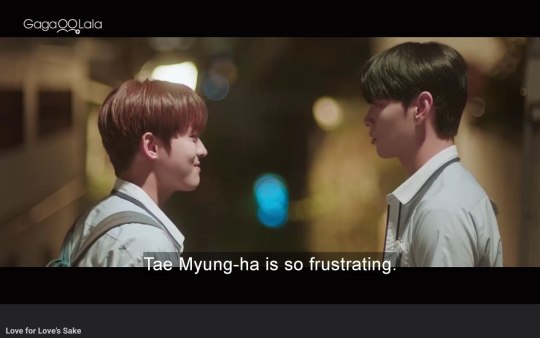

Fast forward again – and now I have to take back my previous statement from another post that Yeowoon never called Myungha by his name because I found the rare case of him doing it xD
"Tae Myungha is so frustrating."
"You're speaking informally more often these days."
Again, a youngster! calling his senior! by his own name! Not using the polite ending! The horrors of informal speech. He's not being too rude but he's sulking therefore he's rebelling. Though I can swear, again, Yeowoon hears Myungha's scolding and resorts back to speaking politely, and from now on, he'll keep using 'senior'.
If you survived until the end of this post, congratulations! The second half probably wasn't needed but in case you're learning Korean or you want to know why these seemingly normal phrases are being considered "curt" out of nowhere, I hope you understand it now a little bit better :)
// Previous messages translation + other language moments here //
#love for love's sake comments#watch me writing my own course Learning Korean with Kdramas on tumblr#but that fight dialogue scene was just perfect i couldn't resist#the exchange and usage of different terms was funny and the scene was hilarious on its own#sangwon and myungha are my heroes#love for love's sake#love for love's sake meta#bl meta#korean bl#korean drama#love supremacy zone#dropthemeta#korean language#linguistics#language
183 notes
·
View notes
Text


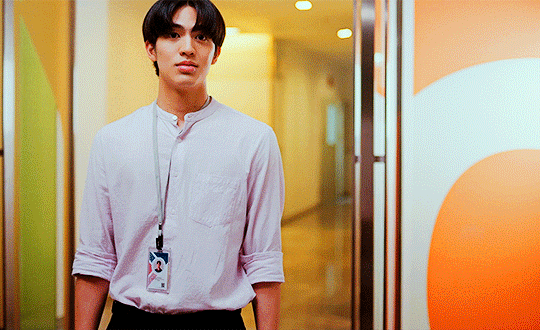
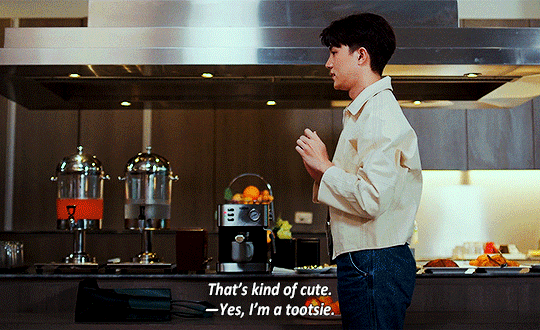


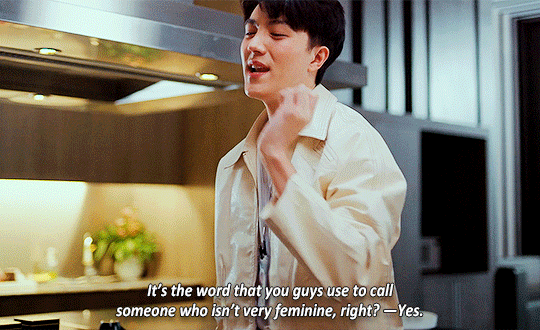
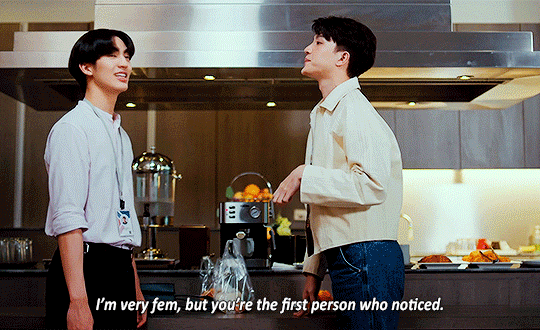
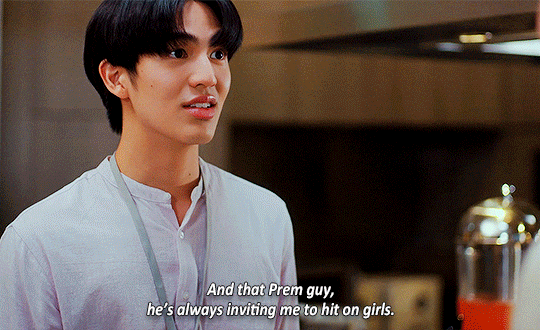
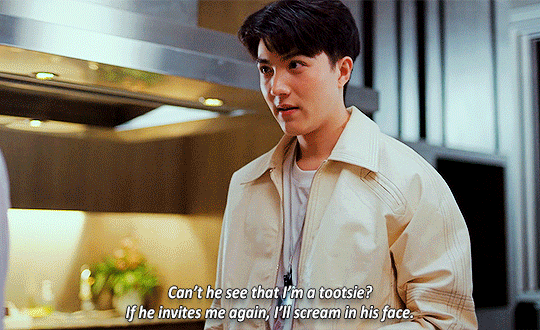
A few notes on Pat and Chot's conversation:
🔹Ke (เกย์) is a neutral expression that is the phonetic adaptation of the English word gay.
🔹Tut (ตุ๊ด) is a vulgar and pejorative expression used to refer to a very effeminate homosexual man and can have multiple translations, as sissy, queen, [or in this case: tootsie] etc.
🔹Je (เจ๊) is a Thai honorific from 姐 for “elder sister”. Chot uses it to refer to himself. Pat later uses it to address Chot.
🔹krap/kha (ครับ / ค่ะ) are gender-oriented particles. Chot uses the traditionally female particle for himself.
🌈Sources: LGTBIQ+ Enciclopaedia, Thaipod101
#step by step#step by step the series#bruce sirikorn#ben bunyapol#stepbystepedit#thai bl#thai drama#bl drama#bl series#my edits.#i added some notes and explanations that imo make this conversation easier to understand#because a lot of the nuances are lost in translation#which isn't the translator's fault - it's just how language works#i love it so much#and i love bruce#and we need more fem gays in bl#who are allowed to be loud and proud and are celebrated for it#Tud/tut might come from the movies Tootsie but I'm not sure#(false friends are a super common thing in linguistics and i haven't checked the word's etymology)#it's a term that chot has very obviously reclaimed for himself
817 notes
·
View notes
Text


The name negotiations have arrived! Linguistic discussions are always fascinating. @absolutebl And they're so cute about it.




They're just darling and awkward about it. Their friendship is so easy going until they have to think about it and then it all goes out the window. Love them for that.


I love them so much. They're just so utterly gone for each other that every moment of affection or closeness just makes them the most awkward men in the world because they don't quite know how to stand together yet.



And the negotiation ends with nothing changing because they really do need to talk about the love first before they change the nomenclature.
#living with him#kare no iru seikatsu#japanese bl#jbl#kazuhito x ryota#bl drama#bl series#asianlgbtqdramas#asian lgbtq dramas#japanese bl drama#japanese bl series#japanese drama#asian drama#jdrama#linguistic discussion
74 notes
·
View notes
Text

Linguistics mention!!
#listen I'm used to linguistics never being mentioned and it saddens me as a linguist#bl series#thai bl#asian lgbtq dramas#knock knock boys#knock knock boys the series
22 notes
·
View notes
Text
Love is Better the Second Time Around ep 4

Photo Credit : Love is Better the Second Time Around Promotional Account on Twitter | https://x.com/koi_nido/status/1772596502365356096?s=46
Gosh, this episode really made me so happy. It really compensated the massive emotional blue balls which I had because of Cherry Magic the Anime episode 11
SHORT REVIEW HERE WE GO ! SPOILERS SPOILERS!!!! DO NOT PROCEED IF YOU WANT TO BE SURPRISED BY THE PLOT
The biggest thing that popped up to me from the episode is the Sukida vs Aishiteru difference in Japanese. Before watching the episode, I had this understanding that, okay, Japanese people prefer to just use Sukida as the stand-in for "I Love You" rather than using the actual phrase of Aishiteru. Even when Hitro described how much he always loves crab cream croquette, he used the word Sukida - chuto sukidasteo -, instead of Aishiteru, granted that he was describing how he loves an inanimate object, not a person. In the cold open, Hiro used the noun form of love, which is "Koi". OH and the nighttime postdate pier confrontation. I really would love to understand which words Takashi actually used. "まずは さ僕と恋をしてみようよ" - Takashi actually used the noun form of love - koi -, the second time in the show. "のに 君が思ってる以上に僕もずいぶん君にはまってるよ" was what Takashi said before the date, here he used the word "into you" or more literally "addicted to you". But then, during the sex scene, while Hiro was riding Takashi I MUST ADD, I was so shocked that Takashi actually said "Aishiteru". The notion of Japanese people being too afraid of standing out by saying "I Love You" really just blew out of my mind immediately. Of course, the context of the scene might actually describe the intensity of their love that crosses the mass mentality of conformity and hence, the utterance of "I Love You". And also, it happened very privately. Not in some streets where other people might judge you more, ergo lowering the bar of whether to say "I Love You" or not. This case of saying I Love You or not is very interesting for me, I really want to understand more Japanese speakers preferred dictions.
The second biggest thing that I noticed from the show is their way of saying Sex. My understanding is that in BL Japanese works, they will just flat out say "Sex" rather than coding it, like what happened in Tokyo in April is..., Straight J-Dramas, on the other hand, just used the word "it". In one of the episodes of Turn to Me Mukai-Kun, the only straight J-Drama that I've watched Mukai-kun talked with one of his previous sex partners, they used the word "it" to describe their no-strings-attached sex. Of course, it's just an observation, I have not watched that many straight J-dramas. However, it turns out, in this series, they much prefer to use the word "it" as well. In episode 3, when Hiro said, before leaving the onsen, "Just because we have done it, doesn't mean we're dating". I really thought it was just due to Hiro's disbelief that he had sex with his ex-boyfriend, hence the implicit shame in admitting, and uttering that he had "sex". But now, in episode 4, during Haru masturbation scene, he says "そもそも好きだししちゃったし", again, the use of "it" Even though, I think the context has shifted, Haru was slowly admitting his love and feelings to Takashi; hence, he may not see the sex as something to be ashamed of anymore. But again, this might come from a very amateur observer of Japanese linguistic culture, I mean, the use of "it" might actually signify the idea that Haru doesn't see what he does with Takashi as "Sex" maybe they see it as "making love" lol, I know, such a corny phrase. However, maybe, Haru is just not at the point of saying that they are making love yet, but not calling it something as casual as "sex", (I’m Not a Girl, Not Yet a Woman by Britney Spears playing in the background). But that hypothesis doesn't really stand as Hiro actually said the word "sex" as they were having sex. What exactly are the connotations of the word "sex" for Japanese speakers?
I really love the consent feature of this episode. Hiro was too drunk to give consent, so Takashi just entertained him in his house, and they went out after Hiro became sober. Weird that they didn't use the trope of being too drunk and being needed to be carried by your love interest lol.
I also love that they used Uke taking care of Seme trope. it happened in My Personal Weatherman, Sasaki to Miyano [not definitive], If It's with You [not definitive], to say the least. I know it's not good in equating all of these heteronormative gender roles to a gay couple, but I think it's a nice trope to show that Ukes have dignity and play such a crucial role in gay relationships. I think it's much better for Japanese viewers to understand the out-of-the-box ness of queer couples by showing more on how Semes can also take care of Ukes - like in The End of the World with You.
ALSO. My brain itch still stands!!!! HIRO REJECTED TAKASHI. NOT THE OTHER WAY AROUND. Gosh, the unequal love trope was called back in this episode. Is this a new trend amongst Japanese BL works?
FURTHERMORE. How can Takashi be that rich? Are university lecturers in Japan paid that well? the apartment, the stuff? HE HAS HIS OWN OFFICE, like what?
P.S. I really love how just mid-wild the sex scene in the end is. It's so typical of this show to be crazily in the middle.
After Takashi proposed and they all got lovey-dovey, omg they look so cute in acting like newlyweds.
Of course, they're gonna break up before reuniting in the finale, wouldn't be a bl if it didn't have one. Gosh, I'm gonna cry so hard in the next episode.
#koi wo suru nara nidome ga joto#japan bl#bl live action#japanese language#linguistics#love is better the second time around
23 notes
·
View notes
Text
It's fascinating to me how Mizuki and Yoh both use short form when talking to each other but you can somehow still hear how Yoh is being more polite and deferring to Mizuki. Just in the way he uses filler words and how he intones stuff and his general mannerisms. Like at some point during the date I actually had to stop and pay attention in case he was slipping desu form in there and I just hadn't noticed.
#my personal weatherman#taikan yoho#i think he might also be avoiding referring to himself as ore in mizuki's presence?#but i'd have to go back and rewatch and really pay attention to his use of pronouns to confirm that#anyway language is cool#and ngl i love watching j-bl simply for being in a language i have some grasp on#and then in total contrast he just DUMPS the sheets on him lol#linguistics
37 notes
·
View notes
Note
You’re the only person (that I’ve seen here so far) that uses the term “QL” I’m assuming this stems from “BL” so instead of Boys’ Love does it mean Queer Love?
Or if not, what does it stand for?
Hi, @porsweaters, and thank you for asking. "QL" does in fact stand for Queer Love. I was originally using "yaoi" (the original term from Japan, brought over to Thailand as "y-series") because I don't feel comfortable using the term "BL" (and the corresponding female term GL where "G" presumably stands for "Girl" - the Japanese term for which I think is "yuri") since I'm generally watching the shows where they're adults and not high school (Eternal Yesterday and 55:15 Never Too Late - sort of - being the exceptions). I think I actually picked the term up from @waitmyturtles (who uses both "BL" and "QL"). I see @justafriend-ql uses it in her handle, although I think I had switched from "yaoi" to "QL" before I knew of her existence.
By the way, this is the first time anyone has asked me a question. It seems like once I hit save, clicking the question in my notifications self destructs, getting an error message. Very strange.
33 notes
·
View notes
Note

It's been a while since I touched theoretical linguistics but i just know that charles would be generative and max usage-based linguistics
YESSSS UR RIGHT… i myself am a generativist and thats also bc the idea of it is so ROMANTIC like language is so SPECIAL in our brains that we dont learn it like we learn other processes… max meanwhile would look at any study from 2021 and be like charles ur a fucking idiot to which charles would discredit the entire methodology (mecore) and claim the paper to have such a bad methodology that the results cant be claimed… they fight about it at the linguistic conference (my lecturer told me this happens irl. quite frequently.) and then they make out 🥰💕
#.txt#max verstappen#charles leclerc#f1#f1blr#lestappen#THANK U FOR SEEING MY VISION#linguistics#<- if u dont wanna hear my ramblings u can bl this#🕯️🕯️🕯️🕯️
38 notes
·
View notes
Note
thai language question! what do tongthap and atom call each other in MLMU TH? it sounds like ‘nai’ or maybe ‘ngai’? it’s translated to both of their names several times on the YT subs. i’ve tried to look it up but i’m not sure i’m hearing it right 🙈
Thai pronoun: Nai
They are indeed using nai. Hold on I know I posted about that one at some point... AH HA here it is:
you want this section: (but I'll c&p it over here add to it at the bottom)
Nai & the Mafia
So in 2022 Thai BLs seriously started moving setting outside of the school systems and thus added new pronouns (for us watchers) into the mix. KinnPorsche, Even Sun, and Unforgotten Night all use the pronoun nai (นาย) for you between men. Like many honorifics & pronouns, it’s derived from a minor title of nobility. In the 19th century it was declared the official courtesy title for adult males - regarded as a direct translation of “Mr”.

It has several different uses today.
As a title, it only appears before the real given name (not surname), in official/formal contexts, e.g. when writing down one’s name on an exam paper, job application, or government form. If used with a nickname, it implies a bit of irony (like a teacher calling out a misbehaving student).
As a pronoun, it’s usually an informal second-person pronoun used with males of equal status. It’s a decidedly non-rude word, so it’ll be used among friends/classmates if they don’t feel close enough to use gu/mueng (or if a person just doesn’t use rude pronouns, like swear words there are people who don’t feel comfortable ever saying guu/mueng).
Rao/nai as pronouns used to be the default mode of address on TV before gu/mueng became acceptable to broadcast in the 2010s.
When used by females, nai is pretty much equivalent to males using ter with females - so an old fashioned but intimate and sweet, loving.
On TV, the use of ter/nai is probably most often associated with straight dramas in the acquaintance phase of courting.
Nai also has the meaning “boss” (similarly to the combined form เจ้านาย (jao nai/chao nai). If it’s being used as a pronoun in a more formal or deferential context (like organized crime), it is used in this sense.
Usage number 2 & 6 are the ones we see in Thai BL. All that said I understand as a tourist in Thailand, you will hear nai but not all that often. It’s fine to use khun instead/back, but good to know to identify nai.
Nai & My Love Mix Up
So My Love Mix Up is using #2.
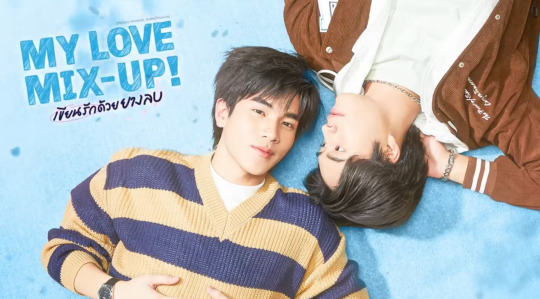
With adult males, nai is actually often paired with chan. (I know, right, but it's what they use. See any of the mafia shows.)
But in this high school setting, Atom & Kongthap seem to be using pom or sometimes even tan. (I haven't touched on tan at all because I find it the most confusing pronoun.)
Atom & Half use guu/mueng. Atom use rao/name with Mudmee, and she does they same with him. Although I think she shifts to chan with Half when they get closer.
Kongthap doesn't seem to ever use informal. Even Half uses nai with him.
So I think the use of polite nai in this relationship is being dictated by Kongthap's character's reserved gentlemanly stiffness (much as in the original show). In other words, were it not for Kongthap's personality, this show in this setting (and with this pair) would be using guu/mueng. But because of the original IP and the extreme reserve of Ida in Kieta Hatsukoi (who also uses quite formal Japanese) we are seeing a linguistic characterization of one half of a couple carry through to the tenor of the whole relationship.

In other words, the use of nai was dictated by Kongthap's personality.
Frankly put, Kongthap would simply not use guu/mueng so they had to find some other way for these two to communicate. Rao/ter is too sweet and cute and old fashioned out the gate (these boys could graduate to it, I suppose, like in college or after).
Now they might have used khun instead of nai. If this were set in uni or the office that would have worked fine. Or even if this were a high school in Bangkok. But I'm not surprised they reached for nai.
In fact, since the announcement of the adaptation I was curious about how they were going to approach Kongthap's pronouns. I thought they might make Kongthap older to solve the issue with phi but they wanted to do the "going away to college together?" part of the plot, so yeah... nai is the solution.
This couple sounds a bit stiff and distanced from each other when speaking together as a result, but I understand why the script chose it.
Hope that explains.
(source)
#my love mix up#thai linguistics#thai pronouns#formal pronouns#thai honorifics#honorigics#Kieta Hatsukoi#my love mix up th#my love mix up thailand#my love mix up thai#thai bl#couple language#nai pronoun
75 notes
·
View notes
Text
>> Updated for ep. 12!
While catching up on We Are, I made a cheat sheet for me to refer back to and thought I might as well share 🤷♀️ and I'm still updating this post as the show airs!
1st 2nd years in Fine Arts
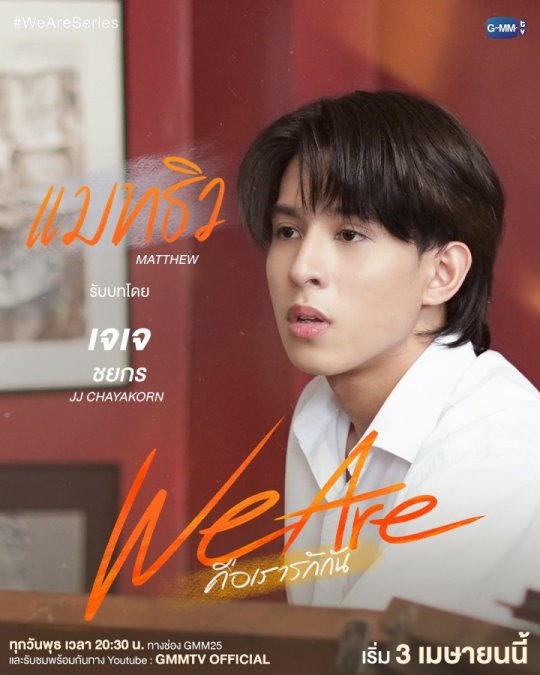

JJ as Matt (Matthew) แมท (แมทธิว), Toey's best friend
Satang as Toey เต้ย, Q's mentee น้องรหัส /nong ra hat/
2nd 3rd years in Fine Arts
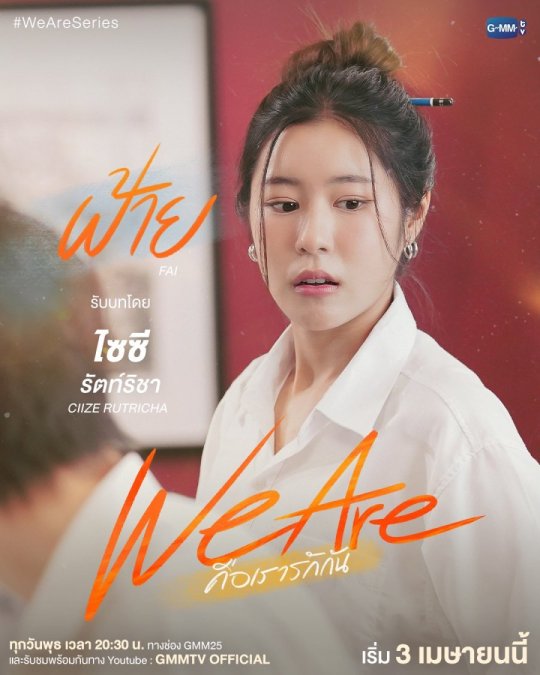
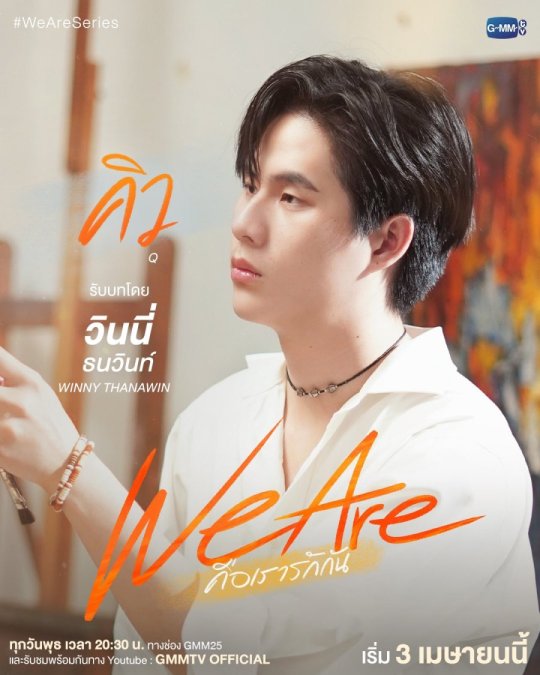
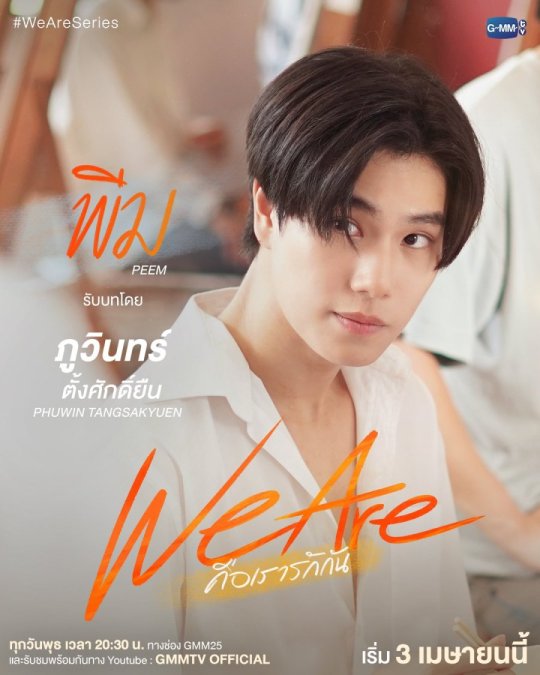
Ciize as Fai ฝ้าย
Winny as Q คิว, Toey's mentor พี่รหัส /phi ra hat/, nicknamed Maestro Q เทพคิว /thehp Q/ (= divine Q)
Phuwin as Peem พีม
2nd 3rd years in Engineering

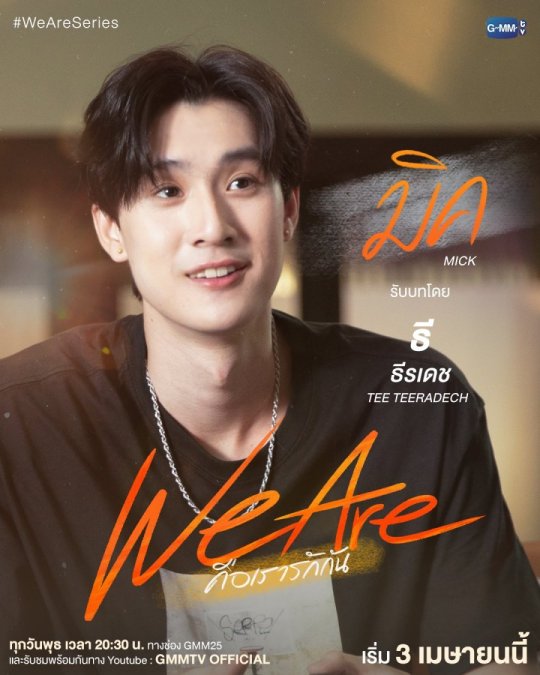
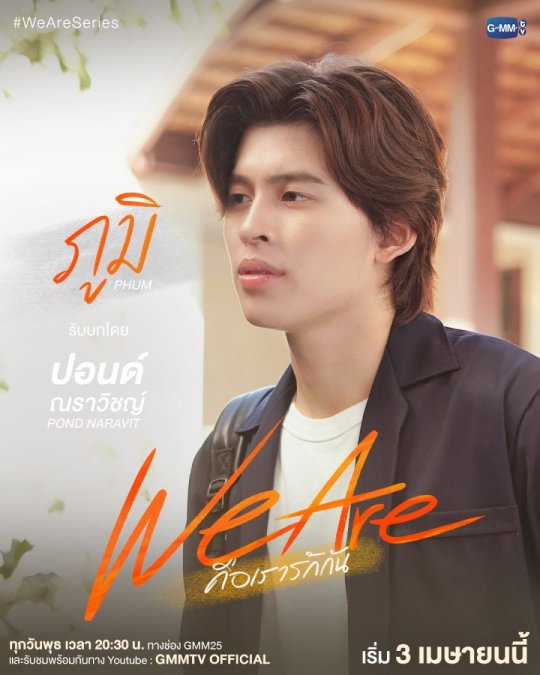

Pepper as Beer เบียร์, Civil Engineering
Tee as Mick มิค, Civil Engineering
Pond as Phum ภูมิ, Civil Engineering
Aou as Tan แทน, Computer Engineering
Other students




Marc as Chain เชน, 2nd 3rd year in Dentistry
Poon as Pun ปัน, 2nd 3rd year in Political Science
Boom as (Khao)fang (ข้าว)ฟ่าง, Phum's older brother, 2nd 3rd year in Architecture
Title as Kluen คลื่น, 3rd year in Architecture, Phum's love rival/pursues Peem (ep. 7-)
The adults



Godji as Aunt Pui อาปุ้ย, Peem's aunt, owner of a cafe
Arm as Oh โอ้, Fine Arts senior, owner of the cafe Q and Toey met at
Na as Professor Po อาจารย์โป, faculty of Fine Arts
Champ as Aueai เอื่อย, the gang's Fine Arts senior, owner of an awful romanization of a name the bar Q works at
Pronouns
the gang:
- Peem, Q, Chain, Pun, and Tan have been friends since high school
- everyone uses กู /guu/->มึง /meung/ (with Fai as well btw)
the brothers:
- ภูมิ /Phum/->ฟ่าง /Fang/ and vice versa
- childhood friends with Toey, used to protect and look out for him
- them, Toey, Beer, and Mick all went to the same school
- there's a third brother who's older than both of them
Peem and aunt Pui:
- พีม /Peem/->อา /aa/ (=aunt) and อา /aa/->น้องพีม /nong Peem/
Q and Toey:
- currently กู /guu/->มึง /meung/ and เต้ย /Toey/->พี่คิว /phi Q/
- nicknames in the past are น้องนมปั่น /nong nohm bpan/ (=Nong Milkshake) "Milk Frappe Boy" and พี่ดินสอ /phi din saaw/ (=P'Pencil) "Pencil Senior"
- Q, though teasingly, called Toey น้องเต้ย /nong Toey/ and himself พี่คิว /phi Q/ in ep. 11 once
Toey and the boys:
- he calls every one of them เฮีย /hia/ except for Q lol and finally, in ep.6, the gang realizes it too!
- they all use กู /guu/->มึง /meung/ with him but by ep. 8 I've noticed Chain, Pun and Phum call themselves เฮีย /hia/ with Toey sometimes
- Matt is the only one Toey uses กู /guu/->มึง /meung/ with since they're same-aged
Tan and Fang:
- กู /guu/->มึง /meung/ in both directions
- Tan also uses เค้า /kao/ -> ที่รัก /thee rak/ "babe" (or just ฟ่าง /Fang/) which is how the gang finds out in ep. 7 that they're dating! AND FANG USED THEM TOO IN EP. 11
- rivals-to-lovers baby!!
Phum and Peem:
- กู /guu/->มึง /meung/ in both directions and I don't think it's ever gonna change -> that moment in ep. 5 after winning the plushie where Phum called Peem by name? Yeah so maybe they are gonna have a change of pronouns
- Phum increasingly keeps using ครับ /khrap/
Previous additions:
ep. 5 - Buffalo and 'feelings in my heart'
ep. 6 - 'Khun meung khrap', hia gang, and the gc name
ep. 7 - Unsubbed lines, 'thirak', and buffalo (again)
ep. 9 - Tomato glasses, song reference, and 'taking advantage'
ep. 11 - Sweet pronouns&particles and 'A ghost's gonna push you!'
ep. 12 - ChainPun crumbs, 'taking advantage' YET AGAIN GMMTV, more sweetness, and the third brother
#we are the series#phumpeem#qtoey#tanfang#chainpun#thai bl#local woman harps on about linguistics#i'm too lazy to tag all the actors and koojin 🤡#local woman harps on about we are
207 notes
·
View notes
Note
Just a regular question - the significance of -kun, -chan and -san (in what context are they appropriately used)? Also, why Kiyoi is offended when Hira uses -kun ?
PS: if you have already explained this previously, please let me know where to find the post :)
Hi!
Thanks for the question! I absolutely love talking about things like this, so thank you so much for asking!!
I feel like this is one of the most boring and at the same time most interesting question to ask about Japanese language, haha. The answer probably varies depending on who you ask, and so I am certain some people will want to add to or correct the explanation I'm about to give!
Wall of text incoming...
Here's a short introduction to some of the social hierarchy in Japanese language
...and how it affects your understanding of interpersonal relationships.
"-san", "-kun" and "-chan" are all examples of suffixes that you attach to people's names according to your relationship with them. The closest English equivalents would be "Mr/Ms/Mrs/Mx" but they are not the same. A lot of subtitlers do translate them like this, but I myself prefer not to do so.
Japanese language and culture is in general very polite and based on social hierarchy. The entire language and how you express yourself and how you conjugate words change depending on your relationship with the one you are talking to (strangers/business relation/family/younger/older/etc etc).
In general, once you get familiar with/close to someone, you drop all suffixes. This is called "yobisute" (呼び捨て). You might sometimes keep some form of "chan" if it's a deliberate nickname - like Koichi calling Mitsuru for Micchan in Eternal Yesterday (It's a cute version of Mi-chan - Mitsuru-chan).
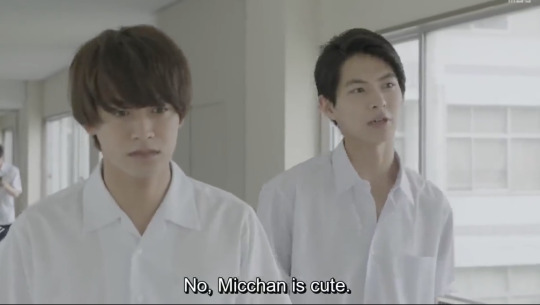
"-chan" is mostly used to refer to kids below the age of 12 (elementary school or younger), but you will also hear young adults use it to refer to females (a male may call his college classmate Miko for "Miko-chan"), in which case it becomes a term of endearment (or, depending on how you look at it, slightly condescending due to the patriarchal nature of current Japanese society and language). Koichi using this nickname for Mitsuru is noticeable - it shows that he is very affectionate towards Mitsuru and considers them to be very close friends.

"You will meet Kim-san at 16:00"
"-san" is the most common suffix. It's the "safest" to use and it has no gender. The first time you meet someone, you would typically address them as "Last name-san", e.g. Suzuki-san. If someone refers to "Suzuki-san" in a conversation, you will not be able to tell the age, the gender or virtually anything about this Suzuki - except that the speaker is not particularly close with said Suzuki. In this case, it will be the equivalent to the English Mr./Mrs./Ms/Mx.
In a school or business setting, a teacher or a superior would normally refer to female students or subordinates with -san. They would add "-kun" to a boy's name. In Old Fashion Cupcake, Togawa says "Nozue-san" and Nozue says "Togawa-kun".
"-kun" is usually used to refer to boys younger than yourself, but typically above the age of 12ish (around junior high school age).
I know that technically it can be used to refer to a girl as well, but I have personally never heard or seen that. If someone refers to "Suzuki-kun", you would automatically assume that Suzuki is a younger male.
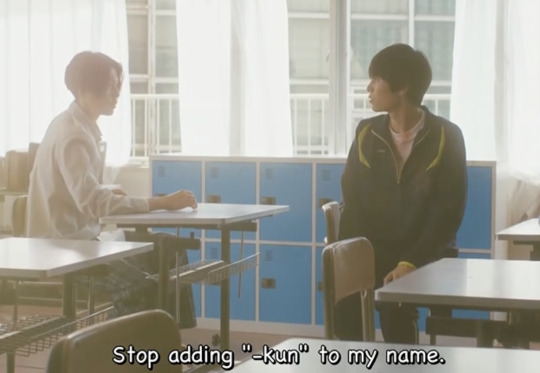
In the Utsukushii Kare setting, Kiyoi is creeped out by Hira referring to him as "Kiyoi-kun" because it is, well, kind of weird.
Girls will call their male classmates for "-kun" and it's fine, because it's kind of cute and submissive; if they're close friends, they'll usually drop it.
Boys will most likely just use last names only, adding no suffixes. Hira referring to Kiyoi as "Kiyoi-kun" not only puts a distance between them, but it even makes him sound submissive. Kiyoi is the only one whom Hira addresses this way - he just says "Shirota" and "Miki" etc. about everyone else.
Kiyoi isn't offended, he's just plain weirded out by it. When he asks Hira to drop it, Hira immediately objects with Muri dayo! ("No way!", "Impossible!") because to Hira, dropping the suffix means lowering Kiyoi from the pedestal that Hira has placed him upon.

Here, Kiyoi literally says "You were able to call (it/me)", because Hira for the first time drops -kun from Kiyoi's name, which immediately changes the relationship between them. Things like this are incredibly hard to get across in a translation, because it's such an ingrained and fundamental part of Japanese culture and language. But it is the first time Hira puts Kiyoi on the same level as himself.
I could do a whole other long post about how the way Japanese people talk tells you so much about who they are as a person (such as whether a boy uses "ore" or "boku" about themselves, or whether they use proper non-gendered speech (like "jyanai") or male speech (which would be "jyanee"). It is an incredibly effective way to show the relationships between characters in media, but sadly this will more often than not be lost in translation.
I hope this answered your question!!
#language in Japanese bl#utsukushiikare#japanese learning#japanese linguistics#美しい彼#my beautiful man#asks
80 notes
·
View notes
Text
went to find the interview where khaotung starts a sentence with ผม 'pǒm' and ends it on มึง 'mueng' as he stops addressing the interviewer and just talks to first and forgot that a different part of that interview gave me brainworms lmao
#linguistics on main#i guess???#not doing ipa for this#i feel like my followers who know ipa can either read thai script anyway or they have no idea who these people are#whereas all the thai bl people have seen มึง romanized as mueng#although maybe not! this might be one of those things where i'm overestimating the average fan's curiosity wrt language
1 note
·
View note
Text
A bit on my linguistic research on LGBT Thai speech
Back in university I took a field documentation course w/ Thai as the target language. My final project was of course LGBT and Thai. The native speaker we researched off of (a linguistics phd candidate) was a gay man himself. So he was able to give me some extra info I wouldn't have been able to find on my own.
He told me that the [x] sound (voiceless velar fricative) can be heard in the northern thai dialect.... or it could be perceived as the speaker being lgbt. [s] is thought to also be pronounced as more dental (closer to tip of teeth).
Also told me that [paŋ] (pronounced bang) is sort of a newer word for trans men. And of course I can't really find info on it just like it was hell finding info on lgbt linguistics in general (worse if it's in a language you don't speak).
Thai does have gendered pronouns and endings. It has a gender neutral pronoun, but it's not really suited for daily use. So yea it can be difficult for nonbinary people. However the native speaker also emphasized that a lot of the time you can kind of get away with avoiding gendered stuff since Thai is a pro-drop language. Plus as I'm sure thai drama enjoyers noticed, people often use their name or title as a pronoun.
The pronoun [lɔ̀n], if used in a certain way, can be interpreted as being from the lgbt community. It’s originally a feminine 3rd person singular pronoun. However now it’s also being used as a 2nd person singular pronoun. The latter is almost exclusively used by LGBT people, especially transgender people. Though gay people may also use it too. So if used in that way, listeners might assume that the speaker is LGBT.
Thats all I have for now. Thai speakers please add things or correct me!! I don't speak Thai myself aside from things I picked up during that class. I took the class a while ago so memory is a bit hazy on some things. A lot of the info I got is from research articles given to me from the speaker, or things he told me during our 1-on-1 meeting. Not that I think he's giving me bad info at all, the man is literally born and raised in Thailand, was in thailand at the time of my research. Just that there's limited info available for me (plus he's not trans himself, just a lovely ally). That and sociolinguistics is not his specialty.
p.s. if any thai speakers (or anyone) wants to talk about lgbt linguistics with me please do
p.p.s teach me thai please and thank you
#honestly that native speaker was the real mvp waking up at 4am to listen to people butcher his language#plus since he is a linguist himself he knew when we were going in the right or wrong direction and would just sit there and laugh#he's friends with my old internship leader and she said that apparently my project was among his favorites so i guess i did something right#lgbt#gay#linguistics#sociolinguistics#thai#bl series#thai bl#thai drama#asian lgbtq dramas#asianlgbtqdramas#lgbtq#transgender#thai language
51 notes
·
View notes
Text
Love is Better the Second Time Around Episode 5

Photo Credit : Love is Better the Second Time Around Promotional Twitter Account | https://x.com/koi_nido/status/1775007525647372784?s=46
Love is Better the Second Time Around Episode 5
POTENTIAL TRIGGER WARNING: Homophobia and Disownment. I’m not going that deep into the topics which include homophobic and depictions of being disowned, however, I’m just trying to be cautious.
Love is Better the Second Time Around Episode 5 is OUT! Let’s get into the short review right away. SPOILERS DUH.
As expected, of course, the couple broke up even though Haru just admitted that he liked Takashi – as well as agreeing to “go out” with him. I want to talk about four topics from this episode.
First theme: Disownment in Japan
I mean, as it turns out, being disowned in Japan is not only caused by homophobia. I think this has been depicted many times in several Japanese TV medias which I have encountered – I think, in general, not achieving the family’s expectations of you will make you really isolated from the family. However, HUGE DISCLAIMER, this subtopic is not going to talk about whether it is more likely to be disowned in Japan compared to other countries nor is it going to delve into the psyche of Japanese families, as well as their internal dynamics, and why they choose to disown instead of choosing other methods in showing their dissatisfaction or repulsiveness towards their kin. This subtopic will focus exclusively on being disowned in Japan by your family because you have been outed as a cis-gay man through the lens of two Japanese BL works: Love is Better the Second Time Around episode 5, Tokyo in April is… episode… I guess the whole series.
To clarify, I’m talking about the act of disownment of a child or an adult by their family, so it’s not about a baby, newly born or not, being abandoned by their mother because of a myriad of reasons. It’s quite hard for me to find a credible source on the internet about the practice of disownment in Japan, be it the reasons, or mechanism. I found this article about how, in the classical times of Japan, disownment is a form of remedy due to your crimes against your “ancestors” (https://www.japanesewiki.com/history/Fukyo.html).
I also found anecdotes that many Japanese families would disown their offspring because they marry “Internationally”- as the film Life: Love on the Line puts it. The anecdotes are very old, it’s from 2007 (https://ask.metafilter.com/83832/How-does-disownership-of-a-child-work-in-Japan
).
Setting all of those aside, let us dig deep as to what happened in the two series. In Love is Better the Second Time Around, Takashi was outed by, who turned out to be, a distant relative of his. The rumor got spread around. He got disowned. He needed to change his surname from Hoshizawa to Iwanaga. I don’t know how he got his PhD in economics, I assume in Japan, only PhD graduates can be a lecturer. Maybe his new adopted family paid for the tuition fee until his doctorate degree, or maybe he got scholarship all the way up to his PhD studies.
In Tokyo in April is…, Ren was saved by Kazuma from being groomed sexually, not the over-the-internet-incredibly-flirtatious-chat grooming. He was forced to be outed in the hospital to describe what He and Kazuma were doing in the love hotel. Kazuma’s mum slapped and told Ren never to meet Kazuma again. Ren was forced to go to a HS in France, not allowed to inherit the hospital of his grandfather. In the manga, his dad was forced to resign from the hospital, in the live-action series, it was not mentioned about his dad’s status after the rumor of his son’s gay sex act was spread around. He needed to change his surname. He finished his HS and his degree, I think, in France. Then he went back to Japan with his new identity and all.
Now, before going to the analysis. Two things that I have observed to stand out very clearly: 1. The disowned son is still given a future, 2. The disowned son needs to change their surname as he is no longer a member of the family. I still don’t know how Takashi got his degrees, financially, but he still could get those degrees and become a respected economics lecturer. In Tokyo in April is…’s finale, Ren said to his sexual-assault-covering boss that he was grateful to him because he “could repay his family’s tuition” because of the job, which means that his disowning family still paid his tuition in France, just as a loan tho.
It's very unique for me to see this representation, because in many western medias, the disowned son becomes unhoused, a fear which still terrifies me today, and his future really becomes uncertain. In terms of name, I don’t really recall disowned gay men in any western media works to have changed their surname or name completely. I understand that many trans- or non-binary individuals or gender fluid people to have done this, be that they get disowned or not. Let me say before we get deeper into my two cents of this subtopic. I’m not saying that disowned gay sons in Japan have it “easier” compared to other disowned gay sons around the world just because that they are not immediately unhoused in these two BL works. I don’t know the statistics, and I really don’t think we should compare our sufferings amongst us gay men.
A). However, does Japan’s own attitude to the idea of a “state” contribute to these representations? I mean, in western media works, the disowned gay son is completely cut-off because said son is not a member of the family and thus not merited the PRIVATE wealth and comfort of the family. Western idea of ownership, state, and cold-war era propaganda of the “nuclear family” really contribute as to why the representation of disowned gay sons in their media become understandable. But in Japanese, it’s very new for me. Or is it a mere fear of criminal prosecution if the family doesn’t provide means for the future of the disowned gay son? I don’t know.
B). Your family name holds a special place in Japan. I know that it also carries a huge weight in many parts of the world, even here in Indonesia - where most plebian families don’t have a surname - your surname holds such an importance too. In most western media works which I have consumed, the disowned gay son, doesn’t really change his name. He just gets own with his own life, as his surname is the last of his concern. I think this connects well with the first observation I made – in most western media works, the disowned gay son is too focused on surviving, that he doesn’t give a fig about what he is called. If we see it in practical terms, let’s say a disowned gay son is moving from somewhere in the deep south of the states, and he moves to somewhere in New York, new England or somewhere in the west coast, his new start will not really check his name on some federal database, his new semi-blue-collar employer will not check his family background. Unless that he has a criminal record, he is free to use his old name or a new one, his family will not be disadvantaged at all because neither his new life nor his family is connected.
Take these observations with huge grains of salt, as I did not revisit many western media works as a reference, and I have not, and did not, included all Japanese BL works which have this trope, such as Umibe no étranger. I completely forgot as to what happened to the disowned gay son, in that anime film, before coming back to his hometown.
Second theme: Foreigners and Japanese
The second theme I’d like to talk about is Japanese relationship with foreigners. The relationship in a sense of how Japanese see foreigners against/for their patrimony. I will not write a lot about this subtopic because it touches complex topics like Japanese nationalism and the Japanese idea of race – topics which I don’t know much about. To talk about this subtopic, I want to discuss two works, Love is Better the Second Time Around episode 5 and Life: Love on the Line (director’s cut film).
Let’s revisit the chatroom/blog discussion website from 2007 (https://ask.metafilter.com/83832/How-does-disownership-of-a-child-work-in-Japan
). One of the posters said that when, I presumed his personal pronouns are he/hem/his, his Japanese wife married her non-Japanese husband, she got disowned. But then, when her sister got divorced, she was “seen better than her sister”. Setting aside the perception of divorced or spinsterish people, isn’t it crazy that based on that one anecdote, his wife’s family disowned their own daughter just because she married a non-Japanese person. Again, I don’t know the statistics hence I don’t know the prevalence of this behavior. I don’t even know whether the poster of the story on the website was telling the truth or not, however this anecdote is a great jumping point in understanding what happened in the two works I want to present.
In Life: Love on the Line, Ito, the bitch who actually kissed Nishi first, asked to break up with Nishi because he wanted to have “a normal family”. Hold up, I need to vent about Ito, WHAT A BITCH, you really don’t appreciate what you got bro. JESUS, I really cannot contain my anger to Ito. Venting side note over. Ito eventually got a divorce with his wife because he still loves Nishi. And, when he went back to his family’s house to announce his divorce, it turns out his sister is marrying a south Asian person, I forgot whether it was Indian or any other ethnicity. His mother became mad and pointed to his sister that she needed to be more like Ito because he has a normal life and family. His mum’s statement prompted him to stand up and said that he’s getting a divorce, and he has been in love with Nishi all this time and adding “compared to International love, it’s pretty normal right?”, or something to that effect.
In Love is Better the Second Time Around, we don’t really see the family dynamics as to why Takashi is called back to his family, besides the fact that because his sister is marrying a non-Japanese person, he needs to be the one that bears the responsibility of continuing his family’s business. I have not read the manga so I don’t know how Takashi family views their daughter’s “international marriage” compared to their estranged son.
Side note, it seems that Takashi is going to decline the offer to continue the family business because he’s gay… huh? I mean in Restart After Come back Home, Mitsuomi still can continue the family business even though that he’s gay. Well, he has not come out yet. Side note to the power of two, Isn’t it weird that a salaryman can just continue his father’s, long established, carpenter business? Like huh?
I really need to understand more about Japanese view on foreigners marrying their own. I mean, it’s a pretty extreme stance to say that, even a heterosexual, “international marriage” is considered a strange, or deviation from a normal one. Is it just because of the practical matter that the non-Japanese person cannot continue the family business? Is it because that the non-Japanese person hard to assimilate to the Japanese culture?
Side note again, does this mean that BL works with protagonists that used to live in the west like Tokyo in April is… and Senpai, This can’t be Love, to name two, also have “full” Japanese parents, just that they used to live abroad…?
Third theme: Haru mental leap
I think Haru in episode 4 and 5 are very different, “bigly”. We just saw Haru getting comfortable in episode 4 of getting in bed and accepting Takashi as his lover – boyfriend. I think in this episode, Haru became braver in his mannerism as well as drawing the line with Takashi. Yes, I will be having sex with you as lovers, yes, I will be calling you my lover, even in front of my own enemy, but I will not be moving into your place, yet. I think because we have seen how Takashi disappointed, or as it turns out, was smeared to look like he disappointed Haru, Haru’s walls were already up, so it’s not easy I guess for him to draw lines.
Someone on Twitter actually translated the conversation Haru and Takashi on LINE. In the chat, Takashi actually congratulated Haru on being the Deputy Editor, and Haru’s response was just like “okay”. Like wtf. This is another trope that I don’t like in Japanese BL works. I think the biggest offender of this trope is Minato’s Laundromat. It’s the trope of “Oh yes we’re now boyfriends, but I’m gonna act too cool to care about it”. Like what…? I mean Hiro’s mannerisms on digital products, E-Mail and social media are so different with his real-life behaviors, to the people that he knows. Why does he still use his journalist face even with Kyosuke?
Fourth theme: Blackmail – Japan’s most loved trope?
Before talking about this subtopic, let me first take my celebratory dance. I’M SO RELIEVED THAT MY BRAIN ITCH IS NOT WRONG OMG. Haru didn’t overhear some sob in the hall that Takashi bet against him. It was, presumably, Kyosuke that took a picture of a young, I think, Haru, and wrote in the email that Takashi was betting against his appearance in the train station.
What is it with BL and blackmail trope? I mean I know that it’s not uncommon for closeted gay guys to be threatened by blackmail about his sexual orientation, but I already see this plot line used in Help I’m Being Harassed by the Sexiest Man of the Year and The End of the World with You. I think The End of the World with You is such a unique one in using this plot line as the perpetrator of the blackmail is also the one who did the gay sex act with the blackmail victim lol.
Side note: I guess in the finale, Haru is bringing up the fact that Takashi is carrying all the burden by himself – gosh this trope again, I’ve seen it in Tokyo in April is…, let’s see how they execute it next week.
linguistic corner!!!!
I can’t believe how many times “aishiteru” was said in this episode. It seems like the show runners saw my blog post about the Japanese disinclination in using the word “aishiteru” and prefer to use the word “sukida”, made script changes and reshot a lot of scenes – I know it’s the conspiracy and narcissism talking in my head haha. I am genuinely surprised as to how many “aishiteru” was said in the episode, is it because that Takashi loves Hiro that much that he said that? I mean in this episode Takashi actually said it not while they were having sex.
I think this may be true as it is actually a point of rift between the two. I think it was since episode 3? That Hiro has always mentioned that their love intensity is different, is it that he feels that Takashi doesn’t love him enough? That’s why he was sort of lingering with the idea that Takashi still sees him as “an outsider”. Side note: while I’m writing this subtopic, I Love by Official Higedandism is playing HAHAH. The way that Takashi kept secret some of his familial stuff, read the previous subtopic about “carrying the burden all by himself”, I think, made Hiro easier to ask for a break, or rather that he was asking for a break up, but got a break.
Side note: this is the first time that I see when gays break up in a Japanese BL work that his place becomes a mess like in western media works, I mean all I see in other works is the guy failed a class (The End of the World with You), the guy continues his life but still missing his ex (Life: Love on the Line, Although I Love You, and You?, Mr Sahara and Toki-Kun, My Beautiful Man, Pornographer).
All in all, I can’t wait, albeit dread, for the finale next week !
#japan bl#gay#linguistics#japanese language#love is better the second time around#koi wo suru nara nidome ga joto#bl live action#bl series
22 notes
·
View notes
Text
my working theory concerning thai bl subtitles is that every translator has a dartboard next to their desk and every time they have to translate a verb into english they close their eyes and throw a dart at the board to decide which tense to use. there's no other explanation
#misc#linguistics#*mine#like i KNOW that time works differently in english than it does in thai#but i feel like a translator should at least have a general grasp of the verb tenses of the language they're translating into#i haven't seen a single bl series that got all its verb tenses right and maybe they should all simply hire a native english speaker#to double check the verbs#it would make the viewing experience much less frustrating
2 notes
·
View notes